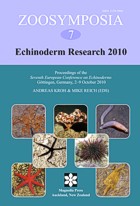Abstract
The German zoologist and paleontologist Ludwig Heinrich Philip Döderlein (1855–1936) was one of the foremost echinoderm researchers of his time. Self-taught in many subjects of natural science, he rose from provincial obscurity to international fame. We present some aspects of: a) his life history; b) his echinoderm research; c) his contributions to ecology and evolutionary biology, with the coral genus Fungia as an example; and d) his achievements in building up and promoting biological collections. The latter is illustrated by the Bavarian State Collection of Zoology, being second only to the Zoological Museum of Strasbourg in the diversity of Döderlein specimens that survived the perils of two world wars.

